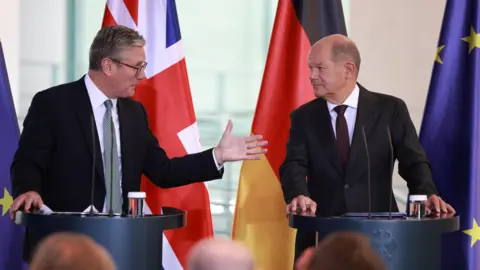Keir Starmer tries to define his post-Brexit Europe ‘reset’

 AFP
AFPWhat’s the meaning of “reset”? That’s the question hanging over the prime minister’s visit to Berlin today.
No one is denying that the mood music is good.
Both centre-left leaders who entered office after long periods of conservative dominance, Sir Keir Starmer and German Chancellor Olaf Scholz are comfortable in each other’s company.
And while Sir Keir has been prime minister for less than two months, this was their fifth meeting – in part a quirk of the England football team getting to the final of the European Championships.
This was their first formal meeting, though. It saw the prime minister use the “reset” word which has punctuated practically every interaction he has had with a European leader since entering office.
But perhaps for the first time, it saw the prime minister begin the work of putting some meat on the bones of what a reset might look like.
Both governments have committed to underscoring the Anglo-German relationship with a treaty.
The low-key Mr Scholz was noticeably enthusiastic, saying that Germany intended to “take this hand that has been reached out to us”.
Two things are especially striking about the leaders’ professed ambitions for this treaty. One is how fast they plan to negotiate it: within six months.
The other is how broad it is intended to be.
In his press conference with Mr Scholz this morning, the prime minister suggested it would cover trade, defence, illegal migration, science, technology, development, people and culture.
Downing Street’s formal announcement also referenced collaboration on energy, supply chains, biodiversity and the environment.
Quite a lot, then.
For some, that will prompt the question of whether the treaty’s intended breadth is a sign of how significant it is, or whether it shows that the treaty is merely a symbolic way of writing down the ways in which the countries already cooperate.
There was one other eye-grabbing phrase in Downing Street’s announcement of the treaty. It said the “ambitious agreement” was designed to deepen “market access” in both directions.
 EPA
EPAAs is wearily familiar to the entire British political class after the tumultuous years of Brexit negotiations, there are clear and strict limits to the access a non-EU country can achieve into a specific EU member state’s markets.
Government sources have suggested that this ambition is really about smoothing market access for UK firms trading in Germany (and vice versa), dealing with specific frictions related to certifications and tendering.
The politics of all this could prove tricky for Sir Keir too.
Having once been the shadow Brexit secretary who made his reputation in the Labour Party by pushing for another EU referendum, he prospered in last month’s general election in part by reassuring 2019 Conservative voters that he would not undo Brexit.
The prime minister reiterated that position today, insisting that the fundamental architecture of Britain’s post-Brexit settlement – outside the single market, outside the customs union – is not up for debate.
That may disappoint others in Sir Keir’s electoral coalition who were hoping, despite his firm stance pre-election, for a shift in office.
Youth mobility
And while that means free movement of people is not returning, there was an interesting kink today on the possibility of a youth mobility scheme, under which under-30s would have more rights to travel, live and work between the UK and Europe.
Mr Scholz suggested in general terms that he wanted more exchanges of people between the UK and Germany, but the prime minister was adamant that he had “no plans” to sign up to such a scheme.
Some cynics will note that this stops short of a categorical assertion that a youth mobility scheme will never happen.
Asked again after the press conference to rule out one ever being agreed, Sir Keir said the treaty with Germany would have “nothing to do with youth mobility or anything like that”.
So what does a reset mean? It certainly means tangible warmth between the prime minister and the German chancellor.
Beyond that, we may have to wait six months and see what exactly is in the treaty.
Source link





